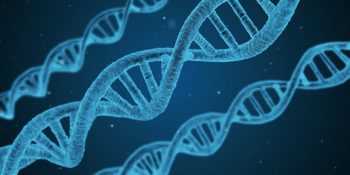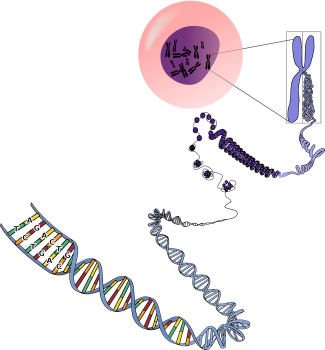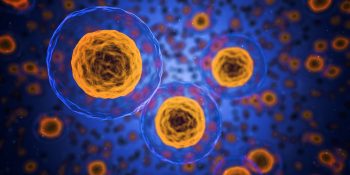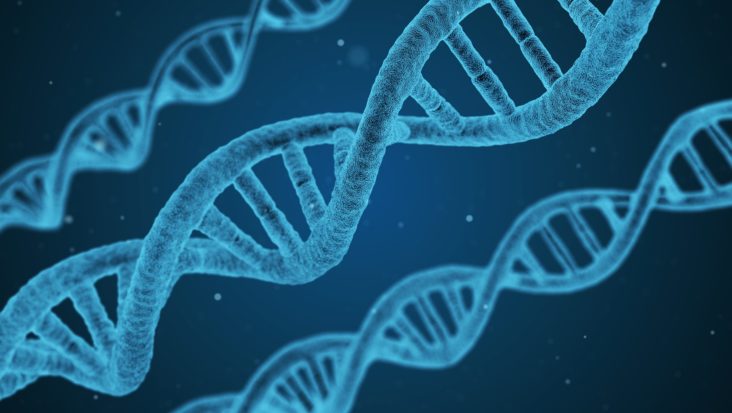 Remember studying genetics in high school? We were taught Mendelian genetics, the concept that we inherit genes for our traits from each parent off a single strand of their DNA—that beautifully coiled double helix. Every cell in our body has the same DNA, 22 pairs of chromosomes and two sex chromosomes. A perfect example of simple Mendelian genetics is blood type. If you inherit the gene for type A blood from one parent and the gene for type B from the other, you will have type AB blood.
Remember studying genetics in high school? We were taught Mendelian genetics, the concept that we inherit genes for our traits from each parent off a single strand of their DNA—that beautifully coiled double helix. Every cell in our body has the same DNA, 22 pairs of chromosomes and two sex chromosomes. A perfect example of simple Mendelian genetics is blood type. If you inherit the gene for type A blood from one parent and the gene for type B from the other, you will have type AB blood.
However, most of what makes us look, behave, and develop as we do is not due to Mendelian genetics. Although every nucleated cell has the same complete set of chromosomes, each cell behaves uniquely. For example, stomach lining cells make hydrochloric acid needed for digestion and cells under our tongues make saliva, important for the digestion of sugars, our main fuel. Can you imagine if all of this didn’t run smoothly? What if the gene that made hydrochloric acid was somehow turned on in our mouth? Yikes!
 While every cell contains all of the DNA that codes for every process in our body, what actually gets expressed is very carefully regulated. The cells do what they are meant to do by selective expression of some genes and the suppression of others. Our DNA is kept tightly coiled around proteins called histones (think of histones like a spool around which DNA is wrapped). When the DNA is wrapped up, it cannot be transcribed or expressed. Thus, histones play an important role in gene expression.
While every cell contains all of the DNA that codes for every process in our body, what actually gets expressed is very carefully regulated. The cells do what they are meant to do by selective expression of some genes and the suppression of others. Our DNA is kept tightly coiled around proteins called histones (think of histones like a spool around which DNA is wrapped). When the DNA is wrapped up, it cannot be transcribed or expressed. Thus, histones play an important role in gene expression.
This brings me to the recent discovery of epigenetics, which means “on top of” the genome. This is a very new discovery from late 20th/early 21st centuries. It refers to the understanding that factors other than our genes and the DNA base pairs that make up our chromosomes affect our phenotype (how we look, feel, and behave). This doesn’t mean that smoking will change your blood type, as some traits cannot be altered. However, there are many thousands of genes that are significantly affected by environmental and lifestyle factors, especially pollution, chronic stress, smoking, exercise, and — especially — diet.
Epigenetics works partly by attaching small chemical side chains, a methyl group (a process called methylation), to the DNA, for example,or an acetyl group to the histone, to affect gene transcription. It could be due to the process of unwinding a gene from the histone, so that it can be transcribed and therefore expressed, or wrapping it up more, so that it can’t be transcribed, causing suppression.
Here’s how epigenetics may work to reverse cancer. Dr. Dean Ornish took 93 men with early stage prostate cancer and divided them into two groups. One group ate a low fat (11%) plant-based diet, had a support group for stress reduction, yoga or meditation, and moderate exercise (walking 30 mins, 6 days/week). The other group had no diet or lifestyle intervention. After 12 months, all of the men in the intervention group had a decrease in their PSA (a marker for prostate cancer) and none required any treatment for their cancer. In the control group, there was a statistically significant rise in their PSA and 6 men required medical intervention for progression of their disease. Incredibly, on a DNA level, Dr. Ornish was able to show that over 500 genes were altered by this diet and lifestyle intervention. This included the down-regulation of 453 genes that promoted disease, including cancer (like the RAS oncogene), and up-regulation of 48 genes that suppressed cancer and other disease.
 Epigenetic changes to your DNA can be transferred to your offspring if they occur before you reproduce. In 1998, researchers followed the offspring of women who were pregnant during a severe ice storm in Quebec and found that the more stress the women experienced, the more autism, metabolic disease, and autoimmune disease there was among their children. On a molecular level, the amount of methylation in the offspring’s T-cells (part of their immune system) was entirely different depending on the amount of stress that their mothers experienced while pregnant during this natural disaster.
Epigenetic changes to your DNA can be transferred to your offspring if they occur before you reproduce. In 1998, researchers followed the offspring of women who were pregnant during a severe ice storm in Quebec and found that the more stress the women experienced, the more autism, metabolic disease, and autoimmune disease there was among their children. On a molecular level, the amount of methylation in the offspring’s T-cells (part of their immune system) was entirely different depending on the amount of stress that their mothers experienced while pregnant during this natural disaster.
Your inherited DNA is not your destiny. It can be altered by diet and lifestyle and chemical exposures. You have control over some of this, and you should use it (especially when you are young and still desire to reproduce). I agree with what Dr. Ornish prescribes: Eat well, move more, stress less and love more.

Debra Shapiro, MD, is a Board Certified OB/GYN, a Vegan Lifestyle Coach and Educator, and Certified Health Coach. She is passionate about getting the word out about the benefits of plant based eating, and the vegan lifestyle, for the health and well-being of all living things and the planet we all share. Her website is www.anewviewoffood.com.

